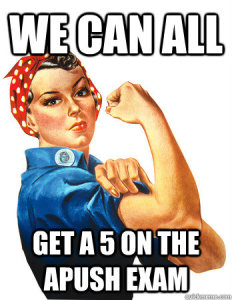October Editorial: History—To Educate or to Promote?
October 19, 2015

Flashback to the end of the 2014-2015 school year.
It’s a few days before the Chapters 12-15 AP U.S. History test, and juniors receive an email from Mr. Baker outlining the assignments he will be checking on test day. He forgets something though, and Diana Bok doesn’t let it slide.
“And concept outline period 5!” Bok emails the class.
Groans fill the courtyard. The concept outline becomes something similar to the Ten Commandments for Baker and his students, and as helpful as it is, at the time, it was another assignment to finish amidst countless discussion questions and study guides.
Last fall, the College Board changed the format of the AP US History test to include two new periods: life in the Americas from 1491 to 1607 and 1980 to the present. Instead of just releasing a list of suggested topics that may or may not appear on the exam, College Board disclosed a list with concepts that must be covered in all classes. These broad concepts give teachers more freedom in choosing specific examples they want to teach to illustrate the given statements. The open-ended statements also encourage critical analysis and debate among students. Seniors, remember those lovely historical thinking skills? Can we ever forget periodization or continuity and change over time?
While Mr. Baker is ecstatic he no longer has to guess what will appear on the exam but simply hammer the key concepts into our brains, history teachers in states such as Texas, South Carolina, Georgia, Colorado, and Oklahoma are not quite as delighted.
These conservative state legislatures say the new curriculum focuses on topics that highlight America’s flaws and are protesting against it. For example, instead of discussing the valor of WWII soldiers, the outline mentions U.S. internment camps; instead of focusing on the democratic motives behind Manifest Destiny, it emphasizes white racial superiority. The purpose of history, however, is not to promote patriotism and present a positive view of the United States but to expose the truth, no matter how shameful it is.
Georgia introduced a resolution that rejected the new version of the course and said if College Board didn’t revise the test, the state would cut funding for the course. Colorado’s school board wanted to establish a committee that would review texts and course plans to make sure materials would “promote citizenship” and not “encourage or condone civil disorder.”
Students and teachers alike protested their states’ restrictions. In Colorado, students waved American flags and carried signs that read things like “People didn’t die so we could erase them,” and teachers called in sick. In response, College Board threatened to withdraw recognition of the states’ history courses if they did not comply with the changes.
Fortunately, living in a state as liberal as California, we haven’t run into these problems, which border along censorship. In 2011, California was actually the first state in the nation to add lessons about gays and lesbians to history classes in public schools. Jerry Brown, who signed the bill, said, “History should be honest.”
We deserve the truth, and not just part of it, but all of it. States, or anyone as a matter of fact, do not possess the power to dictate what students can or cannot learn. Frankly, talking about the negative aspects of our country and how we overcame them encourages patriotism and citizenship more than simply talking about what’s great about the country. History is a subject that allows us to look back and not only be proud of how far we’ve come but also recognize mistakes and try not to repeat them.
I can safely say Mr. Baker does not always present the U.S. positively, as he shouldn’t, as the nation is not perfect. Calling out American generals who had lavish dinners and took naps during battles, condemning the treatment of slaves, and mocking Jimmy Carter, the “peanut farmer,” happen very regularly—probably far too much. However, too much is better than never, and plus, APUSH wouldn’t be the same without its lovely, honest discussions. Everybody is entitled to learning both the good and bad of our nation, and this right should not be taken away on the basis of political agendas.


